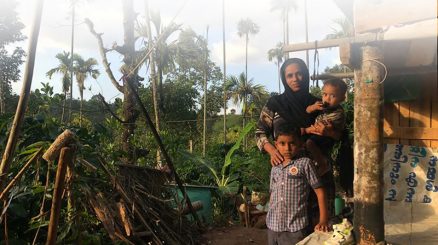Embodying the spirit of resilience learned from the 2018 floods, Kerala has started building climate resilient health centers to deal with future weather uncertainties, said Dr. Manu MS, State Nodal Officer on Climate Change and Human Health during a webinar organized by the National Center for Disease Control (NCDC) on World Environment Day 2021.
Dr. Manu spotlighted the rebuilding of Pozhuthana Family Health Center (PHC) in Wayanad as a flood resilient facility in the state. The case study has been documented by the National Health Mission (NHM) and Directorate of Health Services (DHS) in partnership with Healthy Energy Initiative India.
In his presentation, Dr. Manu highlighted that the Pozhuthana health center was one of the worst affected centers in the Wayanad district during the 2018 floods. The center was under water for two days and had lost most of its equipment, patient records, medicines in the flood. In addition, there were structural damages to the building itself, the floor of the mini hall had broken, and the boundary wall collapsed. There was no power supply as the grid was affected due to landslides and the backup generator was underwater as it was located on the ground floor and the drinking water source was totally contaminated.

He further added that while rebuilding the center under Kerala’s Aardram Mission, the team particularly took into consideration the climatic vulnerabilities of the region and incorporated them in the building so that the new facility can withstand the stress of such events in the future.
Recognizing that the hospital is situated in a flood-prone, low-lying region, and it was difficult to shift the hospital itself, many aspects of the center were retrofitted to become flood resilient. He emphasized the dynamic leadership of the Medical Officer at Pozhuthana health center, the local district team, and the Local Self Government in bringing about the changes and making it a flood resilient health center.
“Climate resilient measures adopted in the health center are our only hope to protect, prevent and withstand the future climate change impacts and save lives and serve our community” – Dr. Manu MS.
Some of the key modifications introduced in the center:
- Compound wall: Reconstructed to withstand the pressure of the water in the future.
- PHC building: All buildings were made double storied. The three buildings have their electricity backup inverters on the first floor to protect them from floodwaters. The medical supplies store is also located on the first floor. There are provisions to shift critical equipment, medicine and vaccine stocks, and medical registers with patient records to the first floor of the building in an event of a possibility of floods.
- Walls of the PHC building: Some of the walls of the PHC were tiled and partitions were made using aluminum fabrication and painted so that walls could withstand the pressure of the water in an event of flooding.
- Outer Courtyard: Concreting with cement and metal rods was undertaken in the front yard of the PHC.

In addition to the structural modification, a robust early warning system, close collaboration with the local authorities and the District Disaster Management Authorities, training of health staff on disaster management, efficient planning, and leadership mechanism has also been established to ensure preventive action in the future. Highlighting the impact of these measures, Dr. Manu added that the health center flooded once again in 2019, as the renovations were still underway, better response and planning ensured that there was minimal loss of property. There were no incidents of flooding in 2020, and the health center carried on the COVID care work uninterrupted.
Download the full report
Background – Study of the impact of floods on the health sector in Kerala
The Kerala floods in August 2018 were one of the worst floods in nearly a century. To understand the role of the health sector and its response to the floods, Healthy Energy Initiative India conducted a multi stakeholder study in November and December 2018. The aim of this study – Building Climate Resilient Health Systems – An assessment of Preparedness of Health Systems to Kerala Floods of August 2018 – was to consolidate the experiences of health care systems, their challenges, and learning during the flood relief work. The survey assessment delved into the role, performance, strengths, and shortcomings of the health systems along with the perceptions and role of public health professionals in an event of an extreme climatic event.
Pozhuthana Primary Health Center (PHC) in Wayanad District was identified as severely impacted due to floods and was assessed as a part of the study. Since then, by keeping in touch and encouraging the Medical Officer (MO) to follow the recommendations made, several changes and retrofits were made to prevent flooding in the future and make their health center resilient. Preparation for facing future floods was carried out by ensuring building strengthening and paving, power backup, clean and dry storage for medicines and medical records. The case study details the efforts taken by Pozhuthana PHC in transforming into a climate resilient health care institution.



